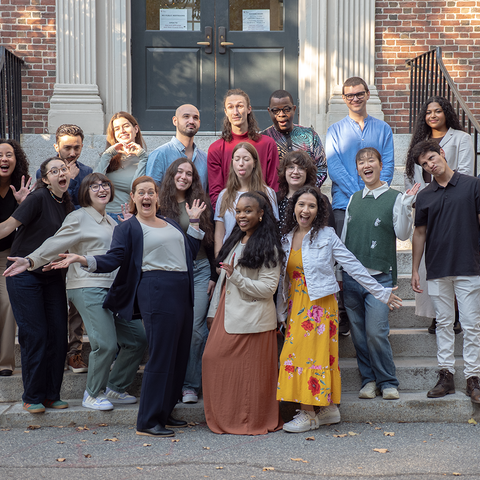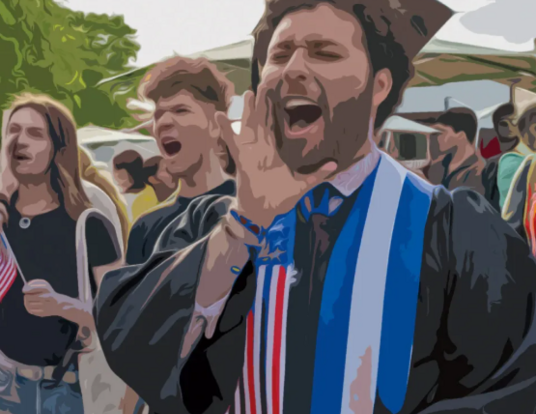Reaching Out, Giving Back
GSAS students give back.
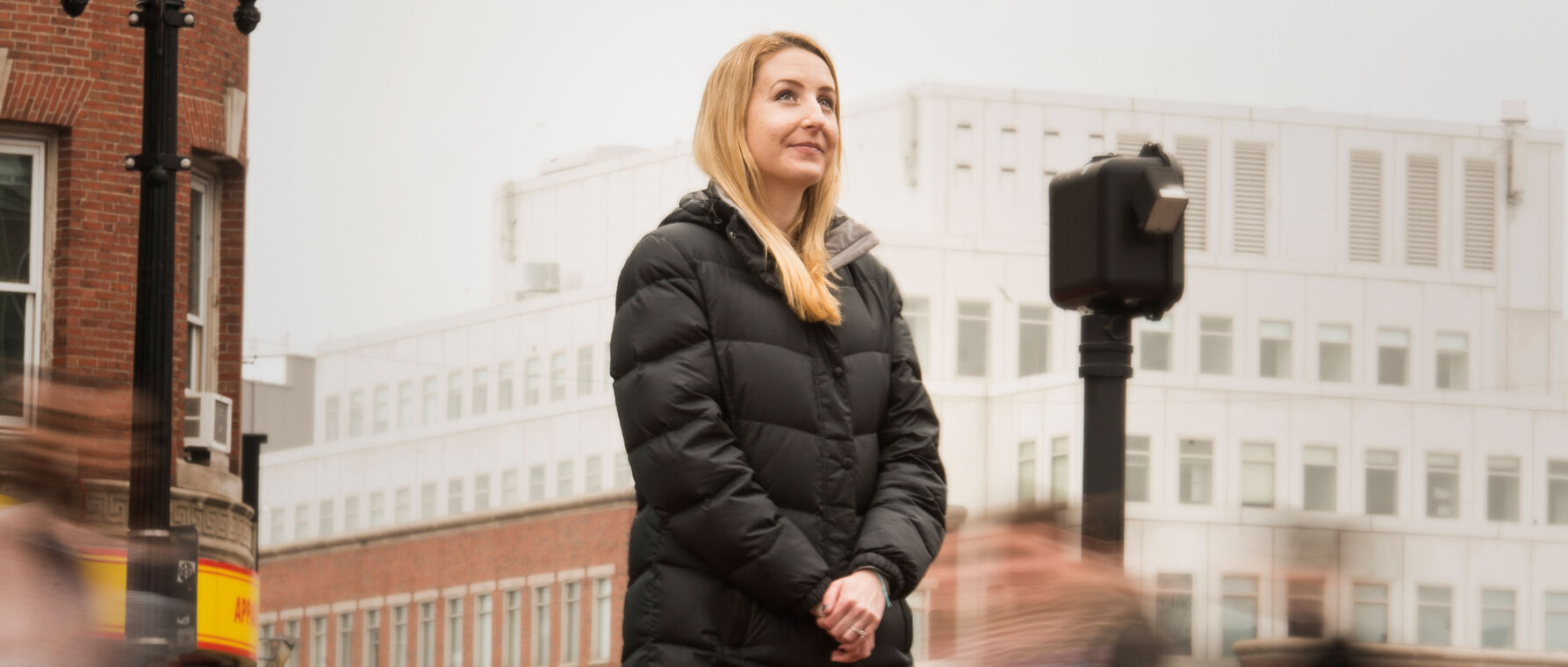
The image of graduate study is often a solitary one, filled with long hours of work in the library, the archive, or at the lab bench—and often that’s the reality, as well. And yet, all across GSAS, students are finding ways to connect their scholarly interests and creative passions with communities beyond Harvard’s gates. Whether they are founding nonprofits, demystifying the latest advances in science for the public, or sharing classical music with new audiences, GSAS students are discovering that what they do outside the classroom provides as much opportunity for learning—about themselves and their community—as what they do in it.
From the Lab to the Great Outdoors
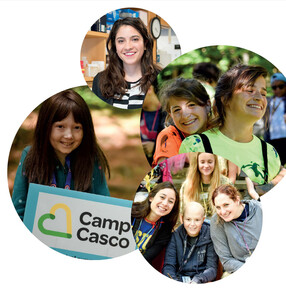
For Erin Fletcher, AM ’15, biological and biomedical sciences, a part-time commitment to service became a full-time career. As an undergraduate in California, Fletcher volunteered at a camp for pediatric cancer patients and survivors. The experience inspired her to study microbiology and devote herself to cancer research—a decision that, in turn, brought her to Harvard. When she arrived in Cambridge in 2013, she went looking for a way to continue her volunteer work, expecting to find a similar camp in Massachusetts.
“I wanted to stay involved and thought a similar camp must exist on the East Coast,” Fletcher explains. To her surprise, it didn’t. For most people, that would be the end of the story, but Fletcher wasn’t interested in giving up. “I thought, if no camp for kids battling cancer exists, we could start one.” Today, Camp Casco is gearing up for its second summer session.
Laying the groundwork for Camp Casco turned out to be just as much an education for Fletcher as her courses in biology, as she faced the challenges of starting and funding a non-profit organization from scratch. She had an ambitious vision in mind: a no-cost, sleep-away camp that would foster friendships among children who shared similar experiences, capable of offering medical care and support, and at the same time providing a place where kids could be kids and do all the typical camp things—from archery, swimming, and canoeing to gathering around a campfire.
The first challenge for Fletcher and the team of fellow graduate students who helped her launch Camp Casco was to raise the $50,000 needed to send 13 campers and a team of 22 counselors and medical professionals to camp in the Berkshires. She started locally, asking members of her department for donations.
Research can be hard, and its benefits aren’t always immediately apparent. I wanted to have an impact, not in 15 years, but today.
Whitney Silkworth, a PhD candidate in biological and biomedical sciences, was among the first to sign on. “I couldn’t donate much money, but I told Erin she could have all of my spare time,” Silkworth says. Together with Yi-Jang Lin, another doctoral student in biological and biomedical sciences, they secured pro-bono legal services to set up the non-profit, and then Silkworth turned her eye towards helping Fletcher raise money.
According to Silkworth, who now serves as Camp Casco’s Chief Operating Officer, the challenges of serving as director of corporate relations for Camp Casco have provided her with a new and unexpected skill set. “In science, I lead with the data and culminate in a conclusion, but in fundraising I have 30 seconds to grab the donor’s attention,” Silkworth explains. “Instead, I lead with impact and emotion.” The experience has definitely benefited her graduate studies. “The skills I’ve developed really complement my research work.”
Her philanthropic efforts are also providing much needed balance inside the lab. “Research can be hard, and its benefits aren’t always immediately apparent,” she shares. Although Silkworth knows her work in the lab will ultimately pay dividends, she’s realistic about the slow timeframe involved in bringing the innovations of research to patients. “I wanted to have an impact, not only in 15 years, but today as well,” she says. “I can’t cure our campers and I can’t treat them at the moment, but at least I can give them a week of fun.”
Needless to say, the experience of starting Camp Casco has been a life-changing one for both Fletcher and Silkworth. “I had never done anything quite like this before, and it was the best and most significant week of my life,” Silkworth says. Fletcher has translated her part-time commitment to Camp Casco into a career—she left her program in spring 2015 to run Camp Casco as CEO.
Science for All
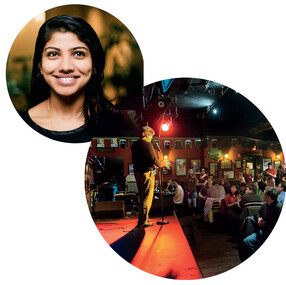
While Fletcher’s and Silkworth’s vision extended all the way from the lab to Western Massachusetts, graduate outreach groups on the Harvard campus are ensuring that the University is making connections closer to home.
Take Science in the News (SITN), the graduate-student organization focused on bringing the latest scientific discoveries to the public through seminars, events, an engaging and accessibly-written blog, and their most recent addition, a podcast series. During SITN’s Science by the Pint events, Harvard scientists (often graduate students, but not exclusively) speak informally about their work at Cambridge-area pubs. Topics have included everything from Red Dwarf stars to the treatment of blindness using gene therapy.
For Vinidhra Mani, a fourth-year PhD candidate in immunology, events like Science by the Pint share what it means to be a modern scientist with a local, often non-scientist, audience. “Graduate students are the next generation of scientists. Part of SITN’s mission is to enable students to reach out and be part of the real world,” she explains. “We want others to see that we’re engaged, we don’t just wear white lab coats and ponder minute problems divorced from everyday life.”
Mani, who serves as SITN’s co-director, says that the graduate students who give lectures and talks for the group learn just as much as the audience. “Presenting to nonexperts helps grad students learn how to communicate their work to different audiences, and this is important no matter where you go in your future career,” she explains. “It’s a two-way street. When an audience member asks me a question that I’d never thought of before, not only does it show me that I explained my work effectively, it also broadens my perspective on the project.”
Opening Doors
Oftentimes student outreach projects are sparked by academic interest, but in other cases students seek out volunteer opportunities that diverge entirely from their field of study. Take Chris Faesi, a fifth-year PhD candidate in astrophysics, who has studied music seriously for most of his life and had a career as a professional dancer before pursuing graduate study.
Faesi joined the Dudley Orchestra during his first year at Harvard, playing percussion and timpani. Based in Dudley House, the Student Center at Harvard Griffin GSAS, the Dudley Orchestra offers members of Harvard and greater Boston area a way to continue their serious engagement with music.
Our students were 100 percent engaged in the concerts. Many sat on the edges of their seats with eyes wide open and totally silent. It’s hard to say who gets more out of it, the audience or the performers.
Music is nothing without an audience, however, and throughout its twenty-odd year history the orchestra has sought to engage with the local community. Although low-cost performances have until now been their prime means of doing so, the orchestra has recently begun to broaden its engagement outside of Harvard.
In fall 2014, for example, the orchestra began a collaboration with the Prospect Hill Academy Charter School, a K-12 school in nearby Somerville, that brought classical music into the classroom. The orchestra chose a timeless piece, long used to introduce orchestral music to new listeners: Sergei Prokofiev’s 1936 classic, Peter and the Wolf.
“Each instrument represents a different animal or character,” explains Faesi, now in his fifth year with the orchestra. “It’s perfect for introducing kids to the different voices that make up an orchestra.” According to Nancy Alach, the principal of Prospect Hill Academy, the students were prepared for the performance ahead of time and came eager to ask questions. “Our students were 100 percent engaged in the concerts,” she shares. “Many sat on the edges of their seats with eyes wide open and totally silent.” Faesi says that the pleasure was mutual. “It’s hard to say who gets more out of it, the audience or the performers.”
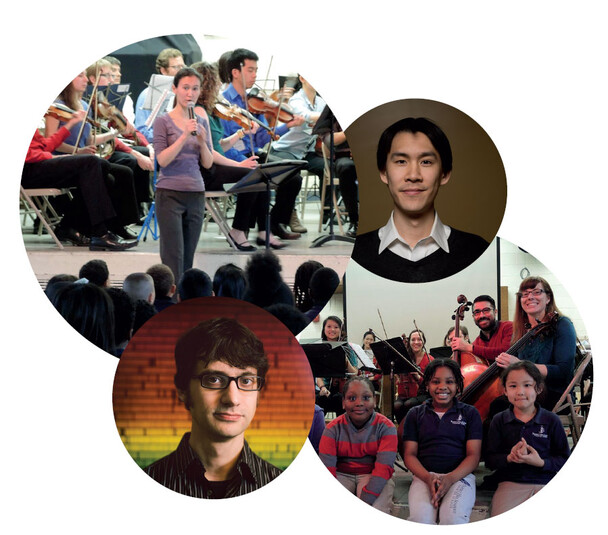
As the enthusiasm of the Prospect Hill students demonstrates, classical music has the ability to speak to and engage people of all different backgrounds and ages. Like Faesi, Aaron Kuan, a PhD candidate in applied physics and former director of the Dudley Orchestra, has been committed to making music for many years. A talented violinist, he participated in the inaugural class of the Harvard-New England Conservatory Joint Program as an undergraduate and went on to receive his master’s from NEC in 2010 for violin performance before coming back to Harvard to pursue his PhD.
According to Kuan and Faesi, classical music opens a door to many central life experiences. “Playing music with others teaches you about discipline and teamwork,” Kuan says. “It’s also a free social environment where children don’t have to worry about fitting in or being cool.” Faesi adds that exposure to orchestral music, and music in general, provides unique benefits. “It’s a wonderful and marginalized art, allowing one to access a feeling of what’s greater than oneself. If we lose that, we lose a piece of our own humanity.” This is the philosophy that drives the members of Dudley Orchestra to share their passion for music with children the same age as they were when many of them started playing.
Regardless of their fields of study, for the graduate students involved in Camp Casco, Science in the News, and the Dudley Orchestra, the benefits of the outreach they do in their precious spare time greatly outweigh the costs. As Faesi puts it, “We all benefit from stepping outside ourselves. As graduate students at Harvard, we’re in a privileged position, and part of that privilege is the duty to share what we know and what we find interesting. We have a duty to reach out to others.”
Photos by Ben Gebo
Get the Latest Updates
Join Our Newsletter
Subscribe to Colloquy Podcast
Simplecast


